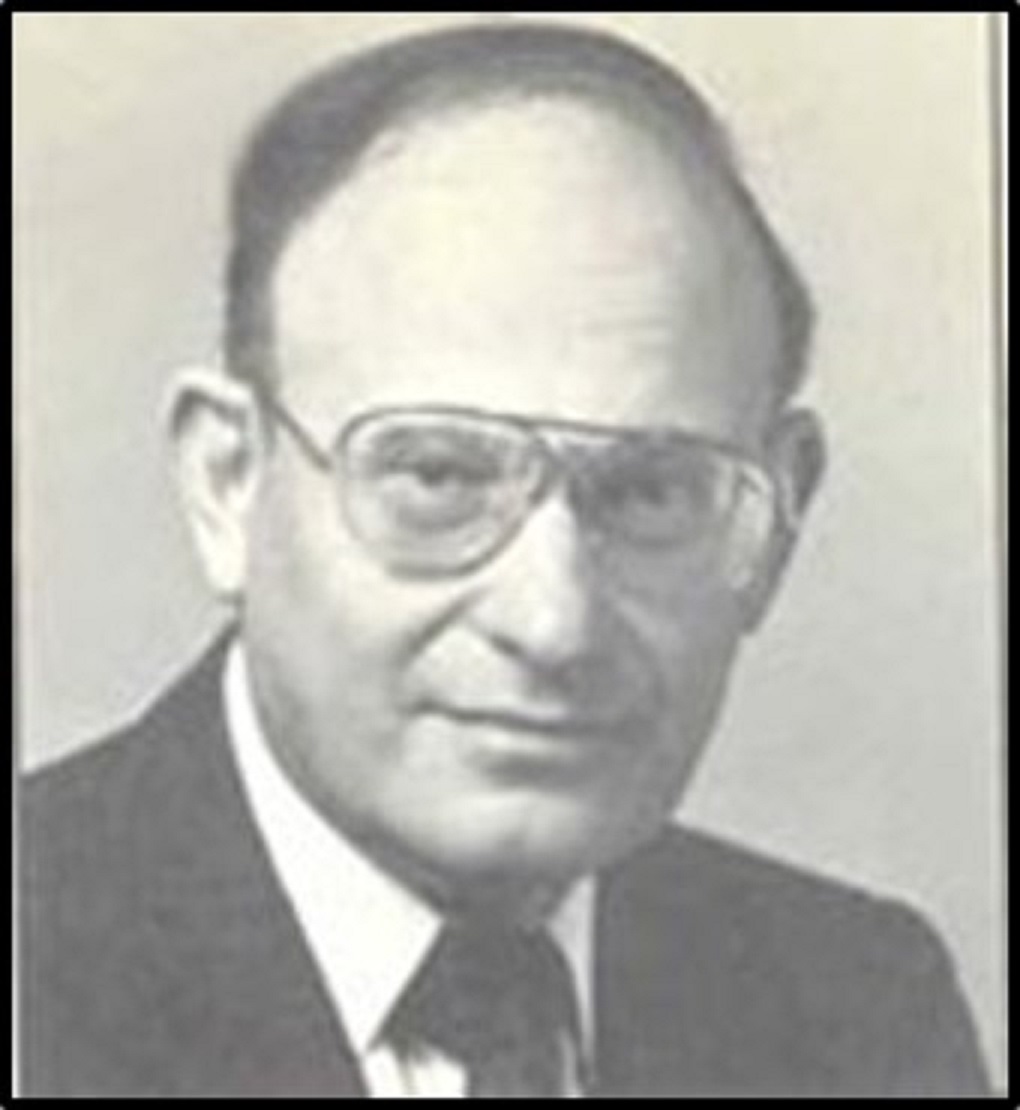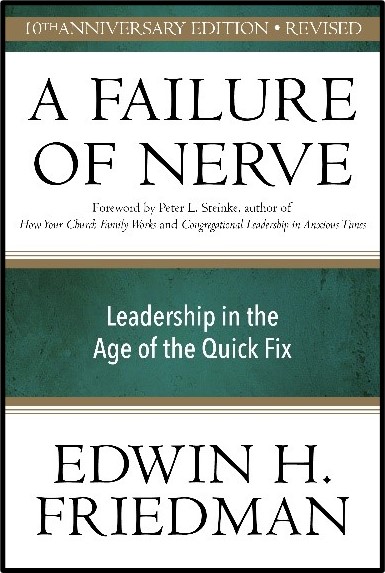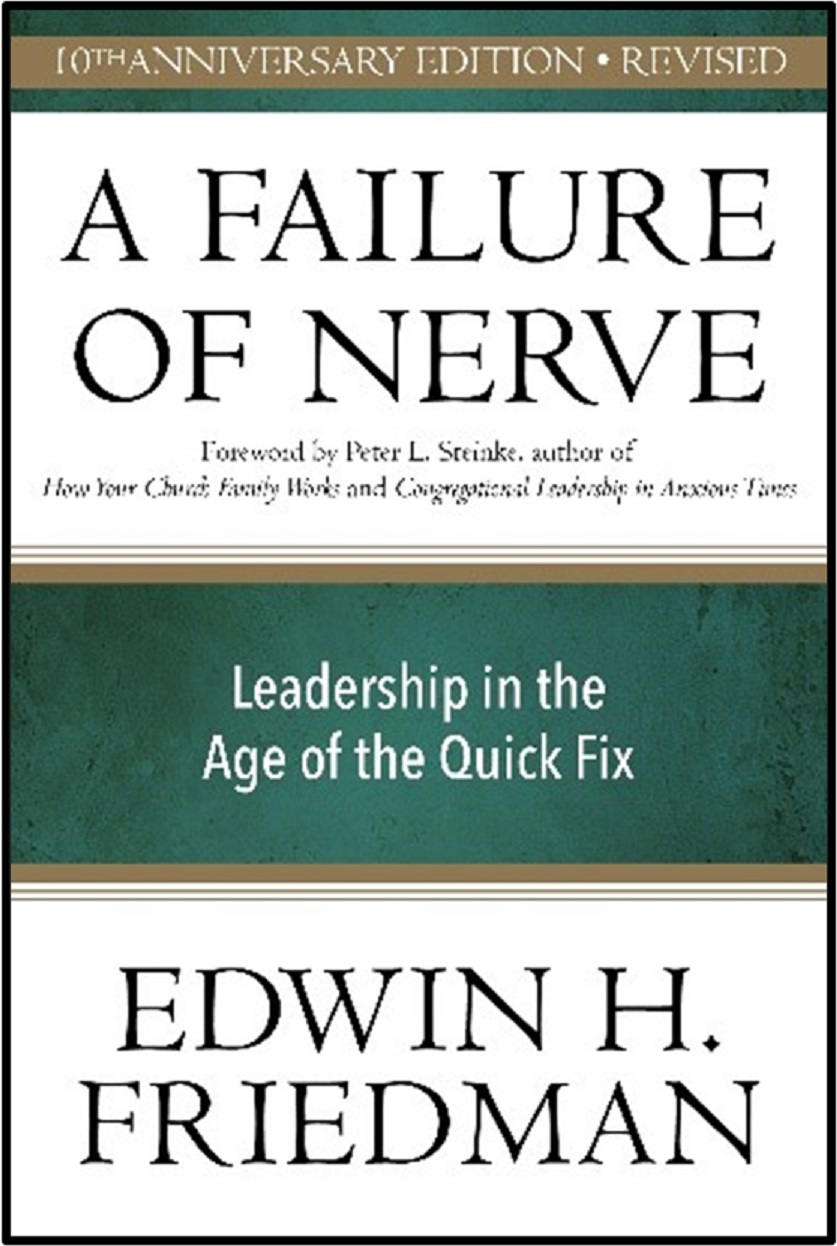THE TENSIONS OF LEADERSHIP, SELF-DIFFERENTIATION, & A FAILURE OF NERVE
Date added: 27/08/21
Introduction
How many million words have been and are being written about Leadership? In 30+ years of experience in Leadership, I have not come across anything that I have found more valuable and useful than the work of Edwin. H. Friedman. All great work must be useful. Friedman identified processes that are universal to all human systems - from individuals to families, from organizations to societies. Often when he referred to leadership, he said, 'from families to presidents'. I have found the application of his key concepts to be useful beyond what could be expected. Of course, there is much in common with other approaches, but his work is also unique. I have put this together as it captures his thinking very well.
 Edwin Howard Friedman was an ordained rabbi, family therapist, and leadership consultant. He was born in New York City and worked for more than 35 years in the Washington DC area where he founded the Bethesda Jewish Congregation. His primary areas of work were in family therapy, congregational leadership (both Christian and Jewish), and leadership more generally. He held a role as a community relations specialist in the White House. He pioneered the application of family theory to religious, medical, education, business, and governmental institutions. Friedman died in 1996 aged 64. Thankfully he left behind some of the best words ever written and spoken on Leadership.
Edwin Howard Friedman was an ordained rabbi, family therapist, and leadership consultant. He was born in New York City and worked for more than 35 years in the Washington DC area where he founded the Bethesda Jewish Congregation. His primary areas of work were in family therapy, congregational leadership (both Christian and Jewish), and leadership more generally. He held a role as a community relations specialist in the White House. He pioneered the application of family theory to religious, medical, education, business, and governmental institutions. Friedman died in 1996 aged 64. Thankfully he left behind some of the best words ever written and spoken on Leadership.
 The Concept of Self-Differentiation was central to Friedman’s work. He applied the idea of the self-differentiated leader to families, organizations, and society. His approach was primarily shaped by an understanding of family systems theory. His seminal work Generation to Generation, written for the leaders of religious congregations, focused on leaders developing three main areas of themselves:
The Concept of Self-Differentiation was central to Friedman’s work. He applied the idea of the self-differentiated leader to families, organizations, and society. His approach was primarily shaped by an understanding of family systems theory. His seminal work Generation to Generation, written for the leaders of religious congregations, focused on leaders developing three main areas of themselves:
- Being self-differentiated
- Being non-anxious
- Being present with those that one is leading
Friedman compares good “self-differentiated” leadership to that present in the great Renaissance explorers, where leaders had,
- the capacity to separate oneself from surrounding emotional processes.
- the capacity to obtain clarity about one’s principles and vision.
- the willingness to be exposed and be vulnerable.
- the persistence to face inertial resistance.
- the self-regulation of emotions in the face of reactive sabotage.
The Tensions of Leadership – There is a Time (Edwin H. Friedman, 1994)
Friedman concluded a 140-minute lecture on Leadership Through Self Differentiation in 1994 with this,
“The tensions of leadership I think are these and these are the Ecclesiastes things that there is a time for this and a time for that. The first is,
There is a time where your major concern should be to remain connected and there is a time where your major concern should be to work at your own differentiation.
 There is a time to pursue the knowledge of facts and there is a time not to worry so much about the facts and the content and to stay focused on the process. A time to pursue facts and a time to pursue process.
There is a time to pursue the knowledge of facts and there is a time not to worry so much about the facts and the content and to stay focused on the process. A time to pursue facts and a time to pursue process.
There is a time to work primarily at staying out of triangles or at least being detriangled. But frankly, there is a time to purposefully create triangles.
There is a time to inform everybody openly and work primarily for openness and there is a time just to keep one's own counsel.
You understand I don't have answers to this. What I'm trying to suggest is it's one's resiliency to move between the extremes and to recognize that there are times in life where either extreme is appropriate.
There are times to be doggedly persistent towards one own goal but there is a time to be primarily sensitive to others. In other words, there is a time to be insensitive or the sensitivities of others will entangle you, and you'll never be able to let go of them.
There is a time to work primarily at avoiding polarization but sometimes there is a time to just stiff-arm. There is a time to just go ahead and brush the tackler aside.
There is a time to be a non-anxious support and there is a time to be a challenger.
There is a time to be decisive and there is a time to out fumble and purposefully not get stuck with the responsibility.
There is a time to do things yourself and there is a time to avoid taking responsibility.
There is a time to act sure and display lots of confidence and is a time to admit limitations.
There is a time to be playful and there is a time to stay serious.
There is a time to work primarily at being self-protective and there is a time to be vulnerable.
Lastly, there is a time to just go on your own authority and this is a time to rely primarily on tradition.
Now as a summing up comment on everything. These are not methods these are not techniques this is not data. There is no right answer to any of these. All one can say is to the extent you commit your life to working at your own self-differentiation you are more likely to make the right decision along all of these continuums.
And with that, the lesson is ended.”
 A Failure of Nerve: Leadership in the Age of the Quick Fix – 10th Anniversary Edition
A Failure of Nerve: Leadership in the Age of the Quick Fix – 10th Anniversary Edition
“Ten years after his death, Edwin Friedman's best-selling A Failure of Nerve continues to offer insights into leadership that are more urgently needed than ever, and this revised, anniversary edition is essential reading for all leaders, be they parents or presidents, corporate executives or educators, religious superiors or coaches, healers or generals, managers, or clergy.”
“Ed Friedman was one of our most brilliant, original, and provocative thinkers across the fields of therapy, ministry, and organizational leadership."
—Professor William J. Doherty, Director, Marriage and Family Therapy Program, University of Minnesota
Reference
Edwin H. Friedman (1994) Leadership Through Self-Differentiation
www.youtube.com/watch?v=nM-sUuQUCac&t=1236s
‘There is a Time’ - min. 136:55
 Bibliography
Bibliography
Friedman, E.H. (1991) Mischief, Mystery and Paradox: Bowen Theory and Therapy, in The Myth of the Shiksa and Other Essays (2008), Church Publishing: New York
Friedman, E.H. (1999) A Failure of Nerve: Leadership in the Age of the Quick Fix, New York: Church Publishing, Inc.
Friedman, E.H. (2007) A Failure of Nerve: Leadership in the Age of the Quick Fix, 10th Anniversary Edition: Revised, New York: Seabury Books
Friedman, E.H. (1985) Generation to Generation: Family Process in Church and Synagogue, The Guildford Press: New York, London
Files
Please leave a comment
Next Steps - If you have a question please use the button below. If you would like to find out more
or discuss a particular requirement with Patrick, please book a free exploratory meeting
Ask a question or
Book a free meeting













